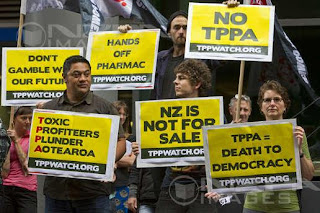Steps forward and back on democratizing trade
Two days ago, Corporate Europe Observatory, the Transnational Institute and the Council of Canadians warned that the proposed CETA trade pact between Canada and the EU would grant energy companies far-reaching rights to challenge franking bans and regulations. These investor-state disputes are used by multinationals to challenge and overturn democratically-enacted laws protecting labor, the environment, public health, or any other common good that gets in the way of the supposed "right" to make money. The three groups are urging the EU, member states and the Canadian government not to include an investor-state dispute settlement system in CETA.
Under the North American Free Trade Agreement (NAFTA) there already exists a precedent for legal challenges to fracking bans and regulations that could be the state of things to come in Europe. For instance, US energy firm Lone Pine Resources Inc., is challenging a moratorium on fracking in the Canadian province of Quebec, suing the Canadian government for compensation.
EU member states already have experience with investor-state disputes undermining green energy and environmental protection policies. Germany is currently being sued by energy company Vattenfall because of the country's exit from nuclear power. Vattenfall is seeking EUR3.7 billion in compensation for lost profits. EU - Canada CETA negotiations were launched at a bilateral summit in May 2009 and negotiators hope to conclude a deal before the summer.
More positively, 12 Latin American governments gathered in Guayaquil, Ecuador at the end of April to craft a common response to investor-state suits.
As Public Citizen reported, "Ecuador, the host of [this gathering] has taken a particularly hard battering from the investor-state system enshrined in NAFTA-style Free Trade Agreements (FTAs) and Bilateral Investment Treaties (BITs)," including a ruling from one tribunal to hand $2.4 billion to Occidental Petroleum after Oxy broke Ecuador's hydrocarbons law, while confronting a ruling from another tribunal that the government should breach its own Constitution and block the enforcement of an $18 billion court ruling against Chevron for massive pollution of the Amazon.
"Seven of the governments present signed a declaration to coordinate efforts in seeking to replace the investor-state regime with an alternative investment framework that respects sovereignty, democracy, and public wellbeing, and announced the launch of an intergovernmental commission based in Latin America to audit investor-state tribunals, draft alternative investment agreements, and collaborate in strategies for reform…. Representatives from the remaining five governments participated as observers and are now taking the declaration back to their capitals to discuss joining the emerging Latin American coalition."
These efforts are matched around the world. Investor-state provisions in the Trans-Pacific Partnership are a sticking point for Australia, while India and South Africa are also eyeing changes in policy regarding investor-state disputes. Clearly, there is widespread grassroots pressure to end this egregious example of corporate rule.





